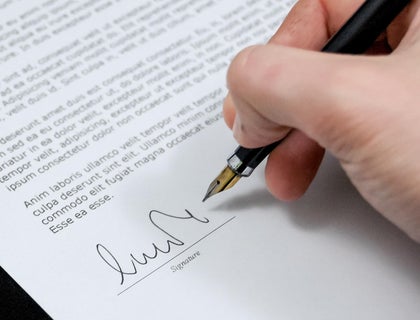Top 12 Cover Letter Tips:
1. Write a new cover letter for each application.
If a cover letter is too general, it will indicate that you have used it for several applications. Hiring managers will likely find this lazy and an indication of a lack of interest in the position. Write a new cover letter for each application, with role-specific information like relevant skills and experience.
2. Address the hiring manager by name if possible.
Addressing the hiring manager will make your cover letter stand out, as most candidates will use "To Whom It May Concern" or "Dear Sir/Madam." You can find the hiring manager's name by looking at the company website, searching LinkedIn, or calling the company and asking.
3. Use the correct format.
Many companies have a specific format for cover letters, and they will outline this in the job description. Make sure that you follow any instructions about format and content so that you are not penalized early on in the hiring process. A cover letter with the correct requirements shows that you can follow instructions — an important skill for most roles.
4. Use a legible font with regular spacing.
A cover letter should be easy to read with legible and evenly spaced text. Opt for a legible but contemporary font that's neat and not too over the top, and make sure its size ranges between 10-14 points, as this will help improve the reading experience for the hiring manager.
5. Keep your cover letter short and to the point.
Your cover letter should not be longer than one page. Try to limit your paragraphs to 300-350 characters to help the reader stay engaged. Your format should be a concise header, one introduction paragraph, two body paragraphs, and one conclusion. There is room for perhaps another paragraph, if necessary, but make sure you are not rambling.
6. Use simple and affirmative language.
Try to avoid sounding too formal in your cover letter, because this makes it difficult for a hiring manager to gauge your personality. It can also come across as being disingenuous. Wherever possible, use assertive verbs like "founded," "initiated," or "managed."
7. Mention the company.
The priority of any cover letter is to demonstrate how you would fit the role. Something that has become equally important is whether you will fit the company culture. Do research on this aspect of the company and include a description of how this appeals to you and how it may align with your values.
8. Highlight relevant skills.
Your resume should list all skills that are appropriate for employment opportunities, but your cover letter should address skills that are specific to the role you are applying for.
For example, a role in marketing might require a candidate with social media and communication skills. Make sure that your cover letter mentions these skills as well as previous experience that demonstrates your abilities.
9. Don't mention what you lack.
Your cover letter is an opportunity to impress the hiring manager. While you should be honest about your experience if asked, your cover letter should highlight the skills you have. Try to focus on how you meet the job requirements and go into detail about those skills or experiences.
10. End your cover letter with a call to action.
The point of a cover letter is to make a memorable impression on the hiring manager, who will likely have to sift through plenty of applications. While it's important that your conclusion include a small recap and a thank you, add a clever call to action that suggests you'd be thrilled to come in for an interview or join their respected team.
11. Check your spelling and grammar.
Spelling errors are one of the more obvious ways to tell if someone has not paid attention to detail. A quick read of your cover letter should alert you to any mistakes. Identifying poor grammar can be a bit more difficult, which is why using simple language can be best. Use spellcheck software that highlights any mistakes you may have missed.
12. Ask a friend or colleague to read over your draft.
Reading over your own writing can lead to skimming because you know what you want to say. However, a fresh set of eyes can pick up on errors or run-on sentences that you may not have noticed. A friend, co-worker, or professional career counselor can help by giving your cover letter a read and letting you know their impression of you from your writing.
How to Ask for a Letter of Recommendation


